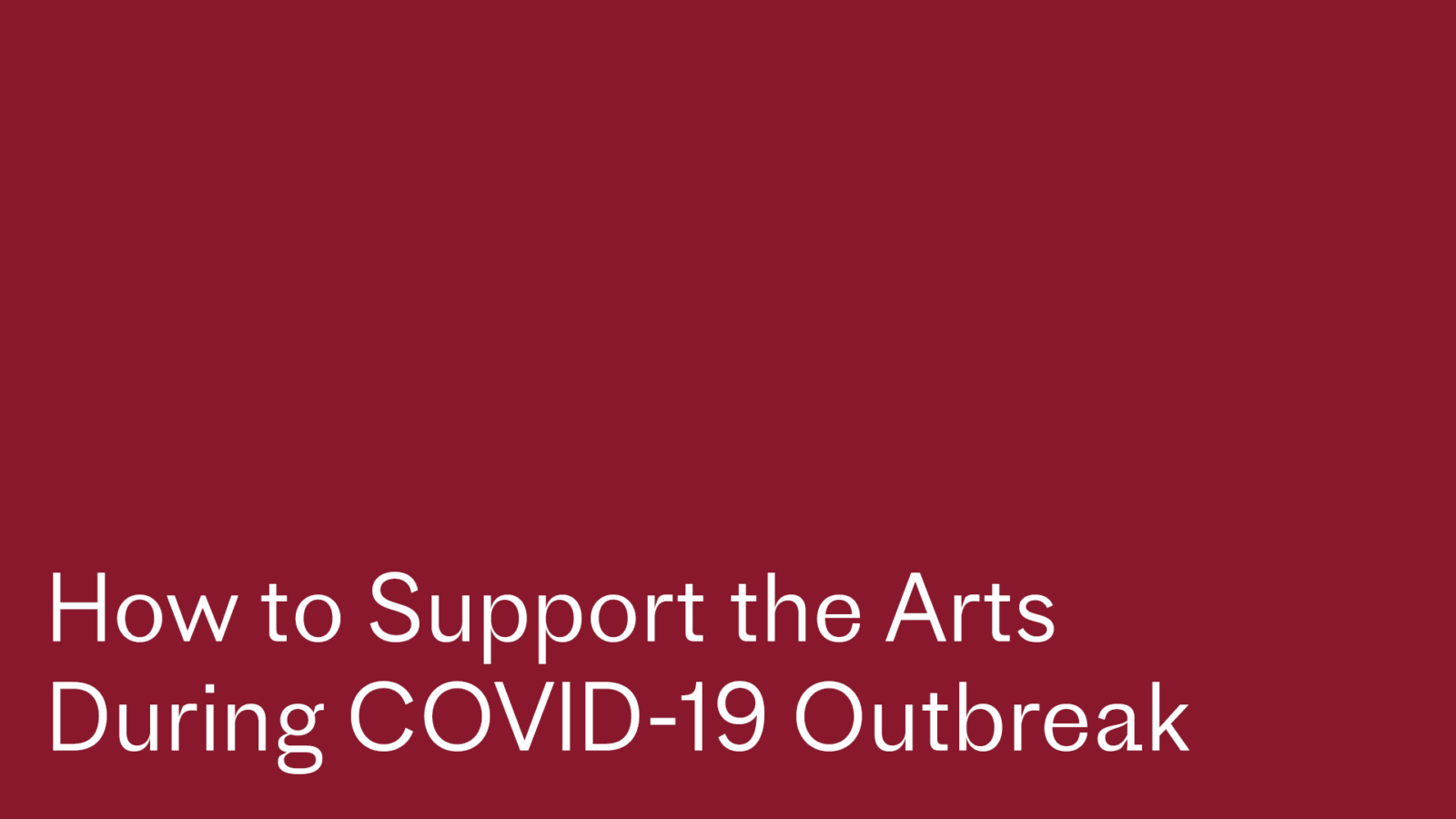How to Support the Arts During COVID-19 Outbreak

As COVID-19 spreads through the country, more and more cities are going into lockdown, closing off arts venues and events and in turn, cancelling artists’ and arts workers’ means to produce an income. With the arts suffering during the crisis, many are pushing for larger reform and funding to aid artists and cultural institutions in this critical moment. Bills that have been passed in an effort to alleviate effects of the crisis, however, do not cover many small arts organizations or freelance art workers. Even larger arts organizations are accruing millions in debt daily, with little government support. Here’s what you can do to help.
Contact your Congressperson, whether by phone or letter, asking them to include $4 billion in funding for the National Endowment for the Arts, National Endowment for the Humanities (NEH), and the Institute of Museum and Library Services to help offset the losses of the nonprofit arts industry. Americans for the Arts has outlined a letter which takes findings from their national survey to back the $4 billion ask, along with support for pandemic unemployment benefits for workers and other provisions. “Financial losses to date are estimated to be $3.2 billion… 91% of responding arts organizations have cancelled one or more events, more than one-third of respondents expect to make reductions in staff; 26% have already reduced their creative workforce. Given that losses documented in the survey have occurred only in the last two months, Americans for the Arts anticipates additional billions in potential revenue losses for the nonprofit arts and culture field.”
The recently passed $2 trillion federal stimulus package allocated only $75 million to the NEA, $75 million to the NEH, and $50 million to the Institute of Museum and Library Services—falling severely short of the $4 billion initial ask. A donation to your favorite local arts organizations can help to offset some of the financial damage of a prolonged shutdown. The new stimulus bill allows non-itemizer taxpayers to deduct charitable contributions from their tax return for contributions made in 2020 of up to $300. Additionally, it lifts the existing cap on annual contributions for itemizers from 60 percent of adjusted gross income (AGI) to 100 percent of AGI for contributions made in 2020.
If you are in an arts organization, also consider contributing your own data to Americans for the Arts’s ongoing survey, designed to gauge the financial and human impacts of the virus.
Because they felt the federal stimulus package did not offer enough to help individual artists, the Artists Rights Society (ARS) launched a petition calling on the federal government to give every working visual artist a check of $20,000. “Visual artists are some of the hardest working Americans,” they write. “Most of them work second jobs to support their passion, and these are exactly the kinds of jobs that are at jeopardy right now.” In return for this investment in the arts, the petition states that Congress may ask each recipient for one artwork for its municipal buildings. Add your signature.
Another petition by the New Art Dealers Alliance (NADA) aims to offer relief to NYC art galleries, artists, and art workers that are not eligible for support from two bills recently passed in the city. Included in the petition are asks for mortgage and rent freezes for commercial tenants, bill forgiveness, emergency medicare, additional grant relief initiatives, and more. “If no action is taken, these businesses will not survive and many artists and art workers will be left without a system of support.” Read more and sign the petition here.
Additionally, regional organizations have taken initiative by creating their own funds to help artists in their communities—these are accepting donations to their cause:
- Artist Trust Relief Fund, Washington State
- Boston Artist Relief Fund, Boston, MA
- Chicago Theater Workers Relief Fund, Chicago, IL
- Indy Arts & Culture COVID-19 Emergency Relief Fund, Indianapolis, IN
- North Carolina Artist Relief Fund, North Carolina
- Performing Arts Worker Relief Fund, Bay Area, CA
- Springboard for the Arts Emergency Relief Fund, Minnesota
Those on the front lines of the crisis—the healthcare community—need our support as well. #GetUsPPE lists multiple ways you can help get personal protective equipment (PPE) to healthcare workers, and if you are skilled with a needle and thread, consider making and donating face masks to free up supplies of surgical and N95 mask for hospitals.
Now is the time to take action and push for a brighter future together.
